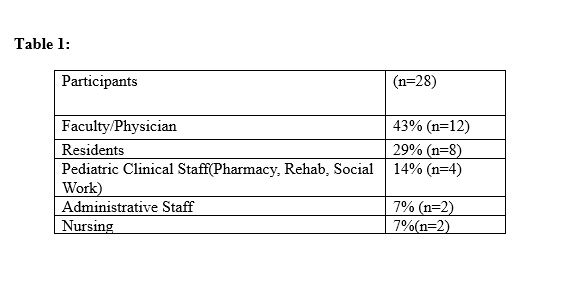Hospital Medicine
Session: Hospital Medicine 3
343 - Stories Heal: A descriptive analysis of storytelling events at a Pediatric Hospital
Friday, May 3, 2024
5:15 PM - 7:15 PM ET
Poster Number: 343
Publication Number: 343.70
Publication Number: 343.70

Saba Fatima, MD (she/her/hers)
Pediatric Hospitalist/ Assistant Professor
University of Kansas School of Medicine- Wichita
Wichita, Kansas, United States
Presenting Author(s)
Background: Storytelling has been shown in studies to improve resilience, establish connections, process trauma & grief, which in turn prevents burnout. In the past two years multiple studies have shown an increase in burnout in pediatric physicians . There are limited studies assessing the impact of storytelling events in pediatrics. Story Slam events were initiated in the Pediatrics Department at KU School of Medicine-Wichita in 2020 to promote resilience and connection amongst staff.
Objective: To assess the impact of oral story telling events in improving resilience, promoting post traumatic healing, preventing burnout and fostering connections amongst members of the Pediatric department at a Children’s Hospital.
Design/Methods: A cross-sectional survey was administered via email to all pediatric residents, faculty, and staff at the Children’s Hospital. Participants were asked to respond to the survey if they had attended any of the three prior Story Slam events. The survey was developed to address questions regarding perceived impact of the events on 1) connection, 2) burnout, 3) healing and 4) patient care. Percentages were calculated for the multiple-choice questions and thematic analysis was done for open ended questions.
Results: Of the 50 attendees, 28 responded to the survey (56%; Table 1). Of participants, 64% were female, 59% aged 25-44, 41% aged 45+. In the domain of connection, all (100%) participants agreed the events made them feel less isolated & more open to expressing feelings regarding patient care with peers. All residents (100%) agreed events helped them connect with faculty. In the domain of burnout, 81% agreed events helped with recognition, 89% agreed they helped in prevention. 93% agreed the event helped process grief. Most participants agreed events enabled them to take better care of patients (93%), & colleagues (96%) in the future. 100% of participants agreed the events brought a positive culture shift & made them think of their own stories in healthcare. Open ended responses revealed following themes: connection to colleagues on a deeper level (breaking walls, insight beyond medicine), normalizing emotions & vulnerability (saw peers as normal people, felt less alone), & shared respect and hope (enlightening, brave, powerful; Figure 1 ).
Conclusion(s): Storytelling events proved to be a novel tool in nurturing connection, resilience and grief processing within our department. This highlights the broader significance of storytelling in healthcare, pediatrics, and graduate medical education as a wellness initiative, crucial to the prevention of burnout.

.jpg)
